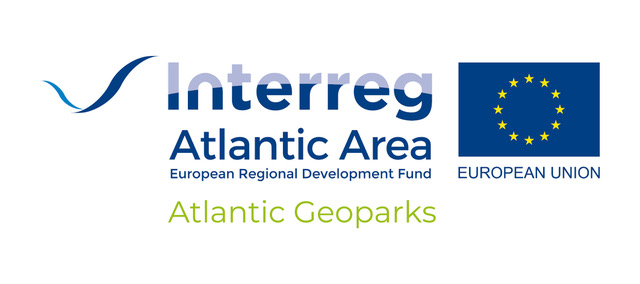This Toolkit has been developed under the auspices of the European Union Interreg-funded Atlantic Geoparks Project (2017-2020), a partnership of nine existing Geoparks, two aspiring Geoparks and a university located along the Atlantic seaboard of Europe.
The Geopark Management Toolkit is designed to offer advice and support to:
- assist aspiring Geoparks to attain full UNESCO Global Geopark status, and;
- to provide additional guidance to new and existing Geoparks which have already achieved UNESCO status but wish to further develop their territory.
What the Toolkit offers
The Toolkit is divided into a series of topics which provide guidance on:
- how a Geopark might be governed;
- key management and operational considerations;
- how communities and businesses are communicated with and engaged in the Geopark, and;
- how the Geopark can be promoted to visitors, all with principles of sustainability in mind.
The Toolkit also considers a Geopark’s important role in:
- the conservation of geological features;
- environmental education, training and research;
- sustainable “geoproducts” and “geoservices”;
- monitoring and recording projects and developments, and;
- enhancing the protection of an area’s natural and cultural heritage.
Finally, it looks at Geoparks in the context of:
- national and international networks, and;
- examines the scope for collaborative working.
The Toolkit may be just one source in a selection of tools upon which aspiring and new Geoparks might draw in developing evidence for an application to UNESCO. However, the Toolkit is specifically designed, through the provision of information and method, to provide guidance and facilitate the production of a relevant and robust submission document with supporting evidence.
The involvement of individuals and organisations from a range of disciplines is encouraged during the use of the Toolkit. Different sections will require greater or lesser input from different partners and stakeholders in the Geopark. In order to avoid unnecessary time and resource costs, and given the nature of some of the activities included in the toolkit, there is considerable potential for cooperation at an early stage whilst completing the various sections of the Topics – the ten chapters.
Included within the Toolkit are examples and Case Studies from the Geoparks in the Atlantic Geoparks Partnership. In some parts of the Toolkit Active Templates are provided to aid aspiring Geoparks in preparing their initial ‘Expression of interest’ to UNESCO, the first step to attaining the UNESCO Global Geopark designation.
Using the Toolkit
You should begin using the Geopark Management Toolkit by considering the Essential Questions for Geoparks. The Toolkit is then divided into ten Topics giving information and advice designed to assist in the further development of your submission documentation:
All the issues raised in the Topics will need to be considered and addressed before your Geopark is ready to submit the full submission document to UNESCO.
The Toolkit is designed to provide uniformity of approach and comparability of outputs for Geoparks seeking UNESCO Global Geoparks status. However, it is still the case that some Geoparks may find they have, or require, more detailed supporting evidence on which they might develop their submission. It may also be necessary to refine the generic approach outlined in the Toolkit to match your Geopark’s requirements, though the Toolkit is designed to ensure dissemination of best practice.
Whilst working with the Toolkit, It should be remembered that the detailed responses to the questions posed will vary between Geoparks, or may not be relevant to your specific Geopark, as they will be dependent upon the nature of issues to be addressed, existing character and geological heritage of the Geopark and the new sustainable development opportunities in your particular territory.
Where to begin?
Essential questions – fundamental issues you should be thinking about as you begin your Geopark journey . . . .
